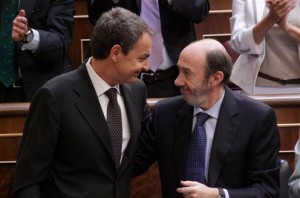
Question: Who is the leader of the PSOE?
Answer: Now, I am. The leader of the PSOE, the leader of a party, is whomever it presents as a candidate at general elections.
Question: I’d say that the leader of a party is whoever is in charge. Who’s in charge of the PSOE?
Answer: In the Socialist Party, I’m in charge.
Question: If you are the leader of the party that supports Zapatero in Parliament, one would suppose that he would consult you on major issues.
Answer: One would suppose that.
The above is a translated excerpt from the interview published on Sunday that El País editor Javier Moreno carried out with Alfredo Pérez Rubalcaba, the Socialist (PSOE) candidate in the upcoming general election (click here for a summarised version in English).
The overall feeling from this exchange, and from the (very long) interview overall, is that Rubalcaba’s role as party leader is not entirely convincing. Is he really in charge? If so, where does that leave Zapatero, who held the party leadership and Spanish premiership in tandem for seven years?
This “two-headed” problem, which the Socialist Party knew would be an issue ever since nominating Rubalcaba as candidate, has been thrown into relief by the recent reform of the Constitution to limit the deficit. Rubalcaba is on record as saying he would have done things slightly differently to Zapatero on this issue. The obvious question is: why didn’t he? If Rubalcaba is in charge of the party that is governing Spain, then presumably he has substantial input when it comes to the “major issues” that Moreno highlights.
But this is where the two-headedness is particularly important. Zapatero and Rubalcaba currently have different agendas. The prime minister wants to safeguard Spain’s economic future; the Socialist candidate wants to win the November election (or at least not suffer a humiliating defeat). Zapatero’s objective means he feels he must take deeply unpopular measures, alienating his traditional electoral base; Rubalcaba’s ambition means he feels he must reach out to Socialist voters with proposals that verge on populism.
It’s a very strange co-habitation of two bedfellows from the same party but with utterly different priorities. The problem is, each is hindering the other and the outcome of this could be twofold: that Spain will not be economically secure and the Socialist Party will suffer a devastating defeat on November 20.
Or the spiel is that the more obvious the differences are today between Zapatero and Rubalcaba, the clearer it will become that Rubalcaba himself, and not only the PP under Rajoy, is actually an alternative to the present government. Thus you can have healthy alternation of governmental power without changing the party in government.
A squared circle. A one party system! Cute.